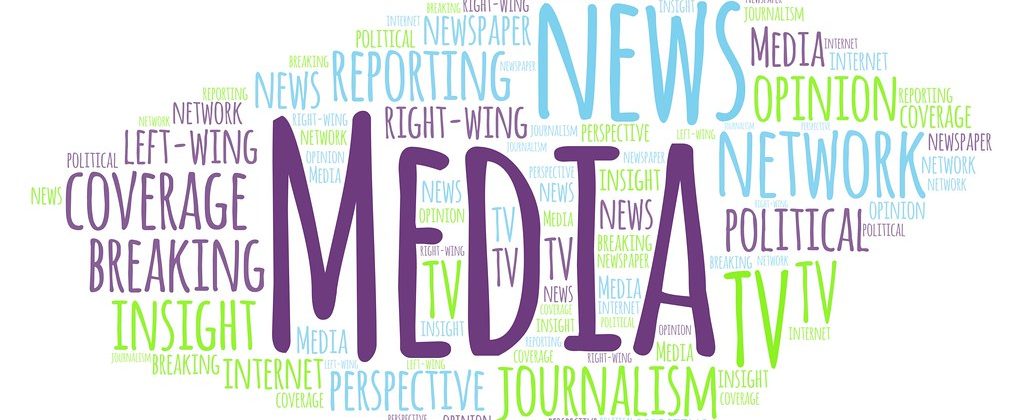

Every now and then, the way that we talk about something gets so off track that it begins to skew accepted definitions. Some people have been fighting back against the liberal use of “literally” these days, for fear that we will lose its original meaning. Some words we have already lost. You will find an interesting example in the word “nonplussed.” It originally meant, and still means, “speechless, perplexed.” But the odds are you don’t usually hear it used that way. People keep using it to mean basically unimpressed. They’ve been doing it so much that dictionaries are starting to acknowledge the alternative definition. It’s now considered an “Americanism.”
At other times, the word itself as signifier seems disconnected from what is signified. “The media” is a great example of this. Everyone talks about the problems with “the media.” But what are we actually talking about?
Sometimes when we are talking about “the media,” we are really ranting about particular outlets. Not uncommonly we are ranting from a position that considers the media outlet in question to be partisan. “The media” has become a kind of code rather than a useful descriptor. This is why you can rant about Fox News as “the media,” while Fox News can also rant about “the media.” Despite the network’s legal protestations, most people would agree that Fox News is some form of media. “The media” has become whatever influences other people rather than yourself.
Ranting about the media is increasingly silly, because we all know you mean some media, not all media. Current is the media. The podcast you love is the media. The podcast you host is media. The Daily Wire is media. No one really hates “the media,” they just hate some of it.
A word which has become especially unhinged from its original meaning has to be “mainstream media.” The “MSM” is what so many people love to hate, but what are they even talking about? Is the New York Times mainstream media? The way we speak about it, yes. And it has about 11 million subscribers. In contrast, we describe Joe Rogan’s podcast as being outside MSM, while it has about 14.5 million listeners. That seems fairly mainstream. It certainly has more than a fringe population of listeners. Ben Shapiro does great in the charts, too. Lately people have been accusing scientific magazines of being too partisan. Nature has fewer than 75,000 subscribers (across 230 countries)—that does not seem very mainstream. Almost no one you know ever looks at a single issue. Perhaps people really mean “prestige media” when they say mainstream, but can’t bring themselves to admit it.
It is also true that complaints about the media are sometimes so cherry-picked that you could never get an accurate sense of the publication in question from the criticisms of it. The New York Times is like the elephant described by group of blind men. For one thing, the paper is often raked through the coals for its op-eds, even though they are only accepted by the editors not written by them. They have been in trouble for publishing op-eds “too liberal” and “too conservative” in recent years. It is also something of a generational belief among American conservatives that the Times is “too liberal”—never mind that they have become a very public forum for explicitly religious columnists. Meanwhile, believe it or not, the left can’t stand the New York Times. People believed it was actively working against the Biden campaign in subtle support of Trump. According to The American Prospect, the Times enables right-wing spin. Somehow the people at Fox News are both aware of this but also very interested in the complaints of conservative commentators who believe The Times is out to silence them. Our strongly held beliefs about media mean that if a publication does attempt to contain “both sides” neither side believes it and it garners only anger from both ends of the political spectrum, not appreciation.
It’s time for us all to stop complaining about “the media,” because the entire conversation has become meaningless. Whenever we say “the media” we really mean something else—so let’s say whatever it is we mean and stop clouding our vocabulary. To some extent, we can all do better by being more specific. We are often only complaining about specific outlets. Some of those complaints are entirely legitimate. But if we are complaining about practices that are occurring everywhere in the media ecosystem but are only bothering us in some outlets… then we aren’t complaining about media at all. If your echo chamber is insufficiently insulated, that is a personal problem.
How can we do better as quickly as possible? When you say “the media,” someone should ask you who you are talking about. And if you sarcastically respond “you know,” that is not a very good answer. And if you say you hate the mainstream media and then quote a podcast that has over 10 million listeners, people should be entitled to laugh at you. And if you have a podcast on the side or a substack or anything else, someone should remind you that “the media” is in the room with you right now. Sooner or later, this will deter you from talking about “the media” in ways that are entirely the opposite of useful.